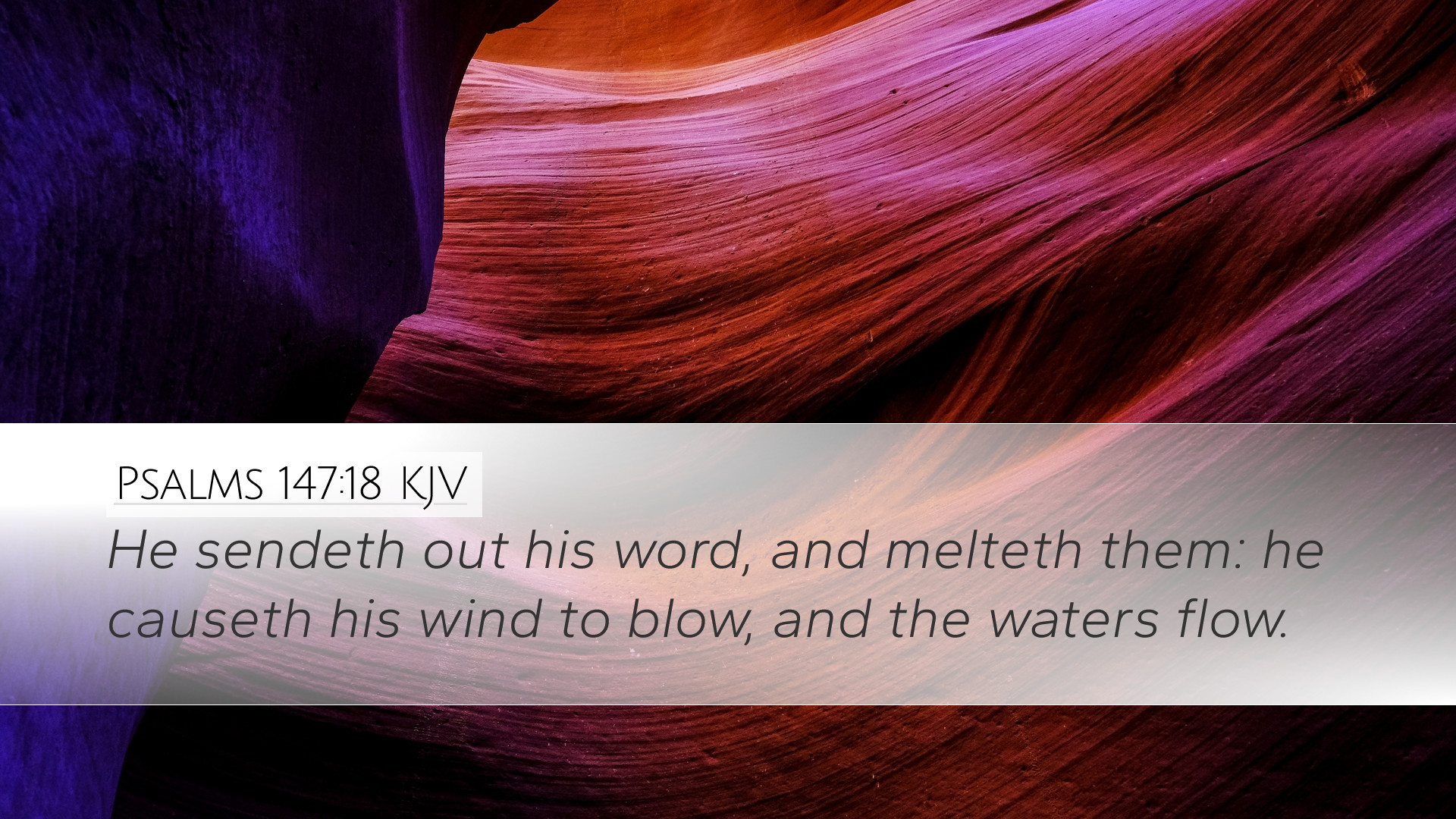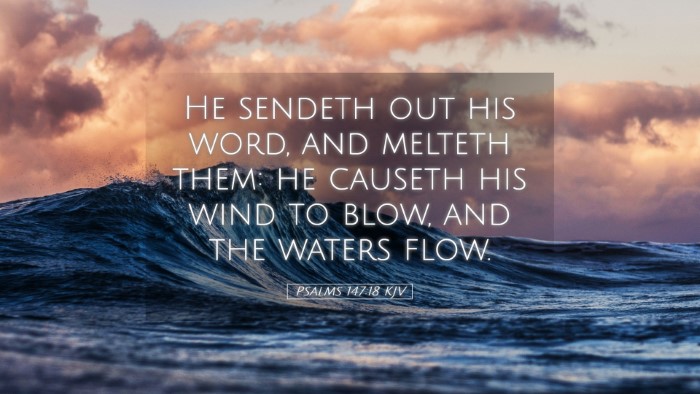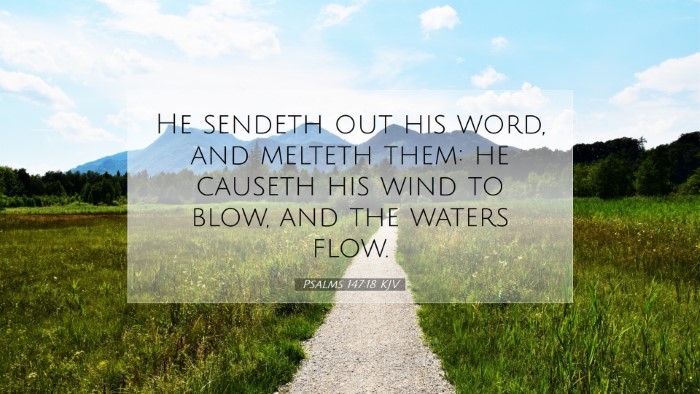Commentary on Psalm 147:18
Verse: "He sends out his word and melts them; he causes his wind to blow and the waters flow."
Introduction
Psalms 147 is a hymn of praise that focuses on God's greatness and care for His creation. The verse 18 is particularly significant as it encapsulates God's sovereign power over nature and His intimate involvement with the world He created. This commentary will explore the depth of this verse, drawing insights from renowned public domain commentaries by Matthew Henry, Albert Barnes, and Adam Clarke.
Overview of the Verse
This verse highlights two powerful images: the sending of God's word and the movement of the natural elements—water and wind. In this regard, God is portrayed as a sovereign ruler who not only creates but also commands the universe, using both His word and His breath to direct and transform the natural world.
Matthew Henry's Commentary
Matthew Henry elaborates on the dual aspects of God's power demonstrated in this verse. He notes that:
- God's Word: The reference to God's word signifies His authority and capability to effect change. Just as God spoke the world into existence (Genesis 1), His word has the power to melt the cosmos, perhaps referring to snow or ice, showcasing His control over the elements.
- God's Wind: The "wind" is a metaphor for God's Spirit, which moves upon the waters, symbolizing both His creative force and His sustaining power. This act can be seen as both literal—bringing about changes in weather patterns—and metaphorical, reflecting God’s ability to refresh and rejuvenate His creation.
Henry emphasizes the importance of recognizing God's omnipotence in our lives, encouraging believers to trust in His ability to change circumstances through His divine will.
Albert Barnes' Perspective
Albert Barnes, in his commentary, provides further detail on the implications of this verse:
- The Sovereignty of God: Barnes notes that the phrase "He sends out his word" highlights God's sovereignty and initiative in the relational dynamic between Himself and creation. His word accomplishes His purposes, emphasizing that God is actively involved in the workings of the world.
- Natural Phenomena: The melting of ice serves as a reminder of God’s power over nature. Barnes notes that this can be both a physical and a spiritual metaphor—the way God can soften the hardest of hearts, bringing about repentance and renewal.
- God as the Source of Life: Significantly, Barnes connects the blowing winds and flowing waters to the idea of life and vitality—both are essential for growth. Understanding this verse encourages believers to view God's actions as integral to their spiritual sustenance.
Through Barnes' commentary, readers are invited to reflect on God’s ongoing work in their lives and the world, encouraging them to see His hand in both encouraging and challenging moments.
Adam Clarke's Insights
Adam Clarke’s exegesis offers additional dimensions to the understanding of Psalm 147:18:
- The Divine Command: Clarke points out that the phrase "melts them" signifies God’s complete authority. Here, “them” refers contextually to elements like snow or ice, but metaphorically it speaks to the power of God to dissolve barriers, both physical and spiritual.
- The Purpose of God’s Word: For Clarke, the sending of God's word can also be seen in light of His promises and decrees. This notion enriches the understanding of how God sustains not just nature but also His people through the promises found in scripture.
- The Flow of Waters: The reference to waters flowing can be viewed as a symbol of abundance and blessing. Clarke suggests that just as water nourishes, so too does God's Spirit nourish the believer, signifying the life-giving properties of both water and divine guidance.
Clarke invites believers to embrace the transforming power of God’s word, suggesting that through it, they can experience personal renewal and the ongoing work of the Holy Spirit in their lives.
Theological Implications
The theological underpinnings of Psalm 147:18 offer rich insights for scholars, pastors, and students alike:
- The Nature of God: This verse reinforces the nature of God as both powerful and intimate. While God is transcendent and sovereign, He is also immanent, actively involved in the affairs of the world and in the lives of individuals.
- Faith and Trust: Reflecting on this verse encourages believers to place their faith in God’s ability to effect change—be it in their circumstances, within themselves, or in the broader world. It is a reminder that the same God who commands nature is also capable of changing hearts and lives.
- God's Sovereignty Over Creation: The assurance that God is fundamentally in control of the elements reminds believers to acknowledge His authority over all creation, prompting themes of creation care and divine stewardship.
Conclusion
Psalm 147:18 encapsulates profound truths about God's character, His power, and His interaction with creation. By drawing insights from Matthew Henry, Albert Barnes, and Adam Clarke, it is evident that this verse serves not only as a declaration of God's sovereignty over nature but also as a source of hope and encouragement for believers. Understanding this verse encourages a deeper trust in God's ongoing work in the world and within our lives, highlighting the importance of God's word and Spirit as transformative forces.


